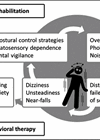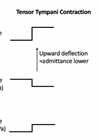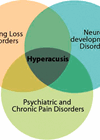Audiology features
Internet-based cognitive behavioural therapy for adults with tinnitus
Tinnitus remains one of the most prevalent and distressing audiological symptoms. Although specialist tinnitus services are in high demand, geographical and service constraints result in limited access to these services. Internet-based cognitive behavioural therapy (ICBT) has been developed to provide...
Hyperacusis-related distress and comorbid psychiatric illness
Research suggests that over 50% of patients presenting with hyperacusis also present with some form of psychiatric disorder. With this in mind, Dr Aazh outlines what tools clinicians can use to screen for psychological disorders and what path to take...
Psychogenic vestibular disorders: understanding and management
‘Psychogenic vestibular disorders’, also known as ‘functional vertigo and dizziness’, are common causes of dizziness and balance difficulty. Although our understanding of their underlying pathophysiology remains incomplete, Drs Diego Kaski and Amy Edwards outline how early identification and positive diagnosis...
Theory of mind and deaf children
Theory of mind relates to a person’s ability to understand the perspectives of others, to be aware that they may differ from one’s own perspectives and the ability to use this knowledge to navigate social situations. Dr Helen Chilton explores...
Middle ear muscle disorders: presentation, diagnosis and management
Patients often report symptoms relating to disorders of the middle ear muscles. Prof Bance gives us an overview of the anatomy and function, as well as guides our diagnosis and management. The middle ear muscles (MEMs) are a mystery, both...
Multifrequency tympanometry
There are many good reasons to start using multifrequency tympanometry as opposed to a traditional, single 226Hz probe tone. Here, Leigh Martin of Interacoustics discusses the uses and benefits. Tympanometry is a core test in the audiologist’s test battery. In...
TEN testing in paediatric patients
Threshold equalising noise (TEN) testing is used to identify dead regions (DRs) of the cochlear. Alexandra Lusty considers the challenges of using the TEN test in the paediatric population as well as the importance of identifying DRs. Diagnosing dead regions...
Enhancing and extending hearing care using Ida Telecare
Tele-audiology has been on our radar for a long while, and evidence shows that its application in clinical practice is beneficial to both patients and clinicians. Cherilee Rutherford discusses the benefits and gives an overview of the freely-available tools developed...
Speech mapping and the benefits of using in clinical practice
Fitting hearing aids is not simply a case of one size fits all. Nicole da Rocha discusses the benefits of using speech mapping as a verification tool. The verification of hearing aids has become quintessential for best practice. Using either...
Physiological mechanisms of hyperacusis: an update
Hyperacusis is a heterogeneous and complex clinical entity, and proposals about physiological mechanisms should reflect these issues. Ben Auerbach helps us navigate through present knowledge in this area, and proposes future directions for research. Hyperacusis is a debilitating hearing disorder...
Sound sensitivity in children
Sound tolerance symptoms in young patients can be a challenge, Veronica Kennedy and Claire Benton share their clinical experience in navigating the issues that can arise in diagnosis and management. In any noisy environment, it’s a common sight to see...
Untangling the emotional and physiological aspects of hyperacusis
In hyperacusis, the physiological and the emotional aspects can become deeply entwined. Dr Sarah Theodoroff draws us into her perspectives on this important aspect of the condition. Background Sounds and Emotions The basic act of hearing sounds triggers an emotional...

















